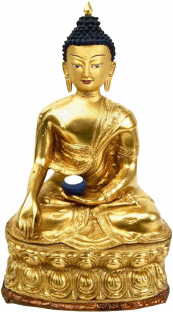Buddhism
 The sacred literature of Buddhism is both immense and non-essential. It consists of written accounts of Sutras (sermons) spoken by the most recent Buddha, who was born in ancient India as prince Siddhartha, and by others of his disciples and enlightened followers. But none of these is essential for Enlightenment, the unmediated experience of Reality as It Is. Since you are part of Reality, this includes the experience of your real self, as distinct from your personality, which is your own creation. Thus, Enlightenment can occur in a sudden flash, without any prior conscious preparation, or after years of meditative discipline, or after meditating on the Sutras, or any combination of the foregoing. Because the Enlightenment experience of Reality transcends dualistic distinctions between self and other, or between anything and anything else, there is no personification of God in Buddhism. (In other words, there is no God in Buddhism, because you're It. So is everyone else.) Buddhists do revere the Buddha, because such reverence evokes emotional states that are conducive to Enlightenment, and because those who are Enlightened are grateful to Buddha for having pointed the Way.
The sacred literature of Buddhism is both immense and non-essential. It consists of written accounts of Sutras (sermons) spoken by the most recent Buddha, who was born in ancient India as prince Siddhartha, and by others of his disciples and enlightened followers. But none of these is essential for Enlightenment, the unmediated experience of Reality as It Is. Since you are part of Reality, this includes the experience of your real self, as distinct from your personality, which is your own creation. Thus, Enlightenment can occur in a sudden flash, without any prior conscious preparation, or after years of meditative discipline, or after meditating on the Sutras, or any combination of the foregoing. Because the Enlightenment experience of Reality transcends dualistic distinctions between self and other, or between anything and anything else, there is no personification of God in Buddhism. (In other words, there is no God in Buddhism, because you're It. So is everyone else.) Buddhists do revere the Buddha, because such reverence evokes emotional states that are conducive to Enlightenment, and because those who are Enlightened are grateful to Buddha for having pointed the Way.
That said, Buddhism has divided into many traditions. Zen Buddhism, which began in China, but later became popular with Japan's samurai warriors, emphasizes sudden Enlightenment, and uses riddles called koans to awaken and develop Enlightenment in Zen students. Tibetan Buddhism produced the Tibetan Book of the Dead, which is a set of instructions to be spoken to a person immediately before, during, and after death, which tell how to achieve Enlightenment in the bardo state between lives, or, failing that, to achieve an optimal rebirth. According to these instructions, a person's spirit commonly swoons into unconsciousness for three days following death, after which it awakens and imagines a body for itself — a curious parallel with the Christian account of the Resurrection of Christ after three days, and with the Christian notion of bodily resurrection in general.
Buddhism's atheistic conception of Divinity is distinct from, but not in opposition to, the Hinduism from which Buddhism arose. Hinduism's infinity of gods are all emanations from a single Divine Principle, as is everything else, including you. Thus, ultimately, you are that Principle, as is everything else. However, there are many traditions within Hinduism, honoring various deities as ends-in-themselves, which leads to religious conflict with peoples of other traditions.
Buddhism Links
Zen Stories to Tell Your Neighbors. See also Popular Zen Stories.
The famous "Ten Oxherding Pictures" and commentary describing the stages of enlightenment.
Resources for the Study of East Asian Language and Thought
See also our Asian section of our Religion Reading List.